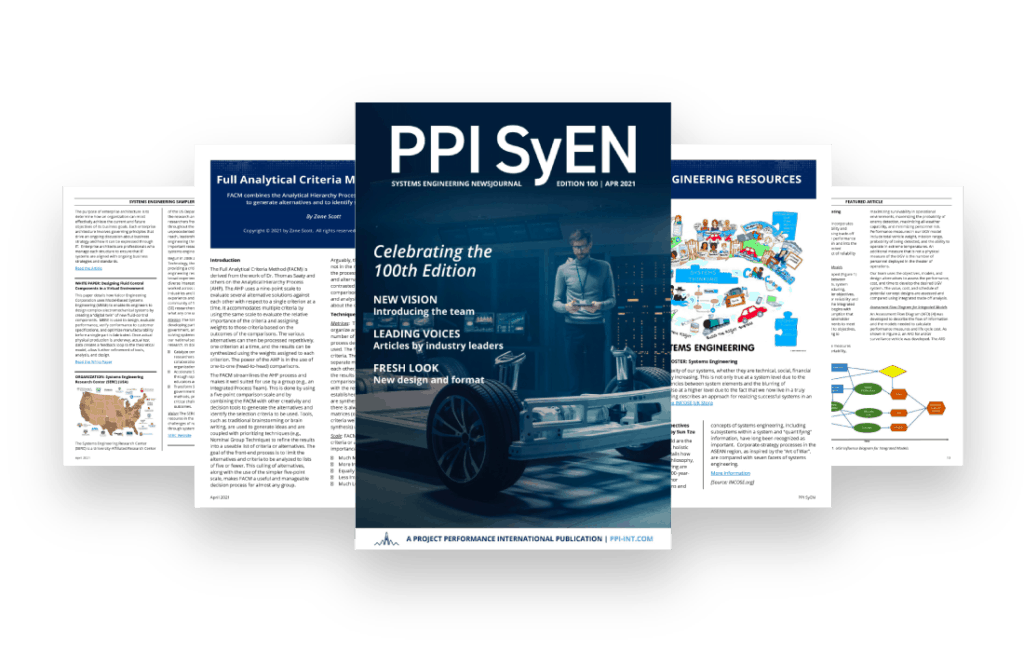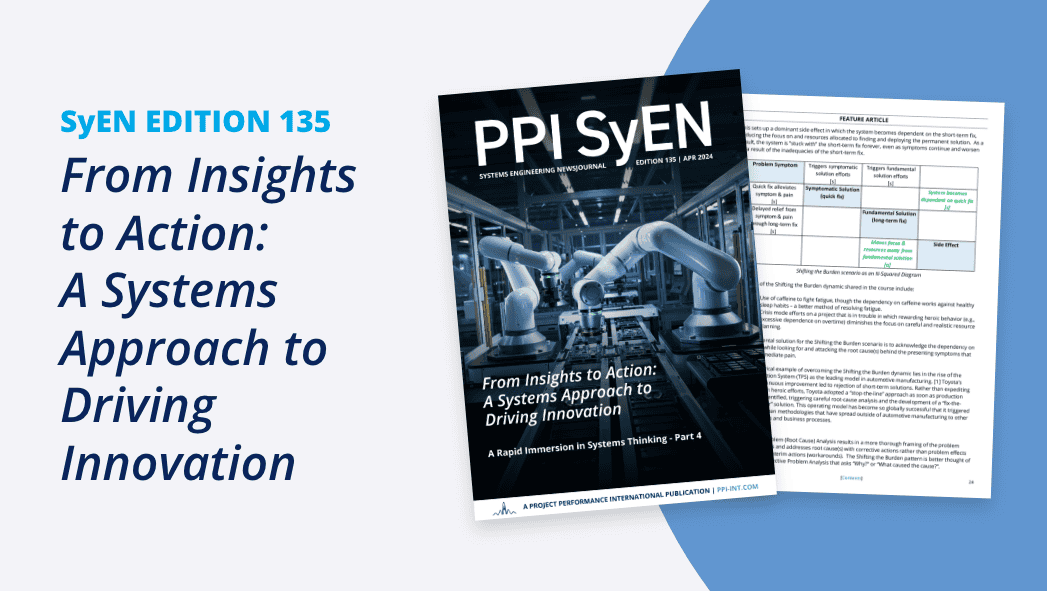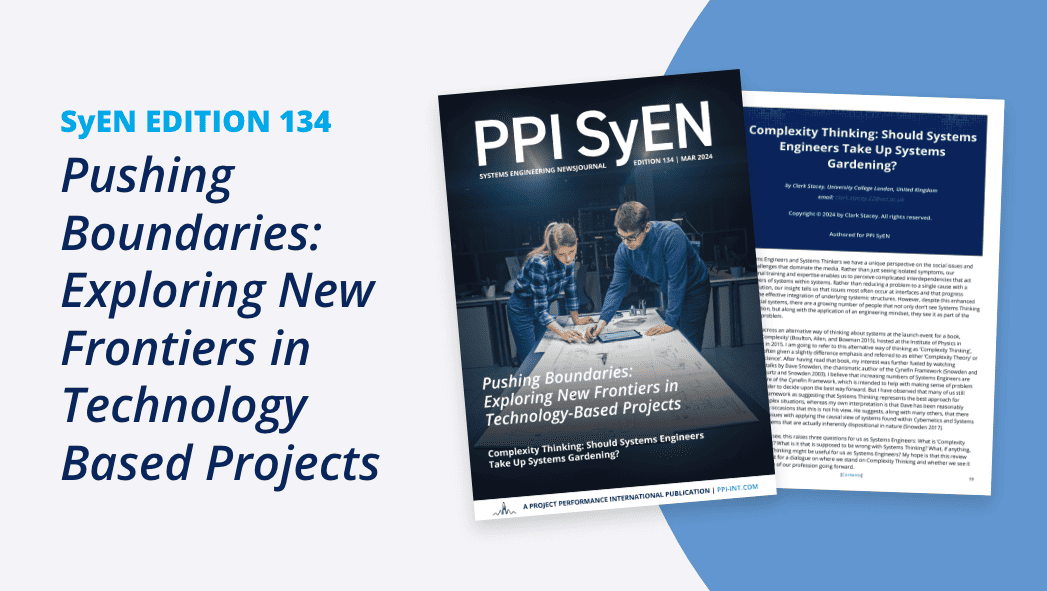WHAT’S INSIDE:
A Quotation to Open On
Feature Article: Managing Time in Time Management: Failure by Belief
Systems Engineering News
- Call For Papers: Requirements Engineering (RE) Journal
- Upcoming Submission Deadlines and Themes for INSIGHT
- The 7th European Systems Engineering Conference (EuSEC) 2010
- INCOSE Webinar: An Update on INCOSE Professional Certification and the New Expert Systems Engineering Professional (ESEP) Designation
- CALL FOR PAPERS: Requirements Engineering (RE) Journal Special Issue on Quality Requirements Engineering for Systems and Software Architecting: Methods, Approaches, and Tools
- INCOSE International Symposium Opens Registration (26 Apr 10)
Featured Societies –
INCOSE Technical Operations – Risk Management Working Group (RMWG)
Systems Engineering Software Tools News
- No Magic Announces the No Magic World Conference 2010
- No Magic Expands and Strengthens its Cameo Suite with Major New Product Releases
- New in ParaMagic 16.6 SP1 – Solving Parametrics with OpenModelica
Systems Engineering Books, Reports, Articles and Papers
- Maintenance and Reliability Best Practices
- Resilience and Ruggedness: Why Faster, Bigger and More Complex May Be Better
- Social Modeling for Requirements Engineering (Cooperative Information Systems)
- A Systems Approach Makes for Successful Engineering, Says Former Cornell Professor
Conferences and Meetings
Education and Academia
- Studentship in Systems Engineering
- Body of Knowledge and Curriculum to Advance Systems Engineering
- Systems Thinking and Organisational Change Research Group (Sytoc)
Some Systems Engineering-Relevant Websites
Standards and Guides
- ISO 31000 and the Icelandic volcano crisis
- ISO/IEC JTC1/SC7 Plenary meeting
A Definition to Close on
PPI News
PPI Events
A Quotation to Open On
TBD
Feature Article
Managing Time in Time Management: Failure by Belief
Gene Bellinger
What better to occupy one’s mind late on a sleepless night than Time Management. This is not the first time my thoughts have been captivated by Time Management. Time Management seems to be something I have pondered at length, usually when I have less than enough time to get something done.
It seems that when faced with recurring time pressure we turn to the concepts of Time Management believing that it holds the answer for an escape from our dilemma. This in fact constitutes a two part fallacy.
Lets get serious, there is no management of time in Time Management. Time is not manageable! Time simply is. As Zig Ziggler is so fond of saying, “We all have the same amount of time, 24 hours in every day.” It’s really a question of what one does within that time that makes the difference.
The second part of the Time Management fallacy is based on the belief that if one simply becomes more effective, a better time manager, then they will be able to accomplish what needs to be done – NOT!
What is to follow is a anasynthis, i.e. analysis and synthesis, of one’s activity within time in an organizational context. The intent is to provide a foundation for a deeper level of understanding regarding the dilemma faced, and provide some more meaningful approaches that can be taken to resolve the Time Management dilemma.
If this will be your first encounter with Systems Thinking Causal Loop Diagrams (CLDs) don’t panic as they are really very straight forward as follows:
- A positive relation, indicated by the “+” sign, indicates thing 1 adds to thing 2, or, a change in thing 1 causes a change in thing 2 in the same direction,
- A negative relation, indicated by the “-” sign, indicates that thing 1 subtracts from thing 2, or, a change in thing 1 causes a change in thing 2 in the opposite direction.
- A reinforcing loop is one in which the interactions are such that each action adds to the other. Any situation where action produces a result which promotes more of the same action, it is representative of a reinforcing loop.
- A balancing loop is one in which action attempts to bring two things to agreement. Any situation where one attempts to solve a problem or achieve a goal or objective is representative of a balancing loop.
- At times there is a significant delay in the interaction and this is represented by two parallel lines on the influence.
You can also find additional information at the links in the references.
| Contents |
I suppose the best place to start is with the situation as it’s perceived, experiencing time pressure.
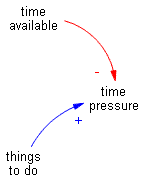
Fig. 1 – Time Pressure
The interaction of time available and things to do results in time pressure. As time available increases it subtracts more and the time pressure experienced decreases. As things to do increases it adds more and time pressure experienced increases. From this perspective, there are three ways to deal with the situation, increase the time available, decrease the things to do, or just live with it. There are actually additional ways to deal with the situation though they are embedded in elements of the system which have not yet been described.
The situation being described assumes an organizational context and the individual experiencing time pressure might be an individual contributor or a manager. I don’t think it will change the way the system unfolds. Within this context it is generally perceived that those things in the things to do category cannot be ignored – they must be dealt with.
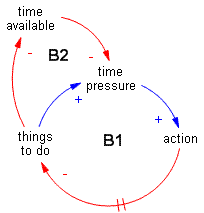
Fig. 2 – Things to Do
From this perspective time pressure influences action which after some delay subtracts from things to do. The reduction of things to do has two effects. First, reducing things to do causes it to add less to time pressure thus creating Balancing Loop (B1). Yet, at the same time, reducing things to do causes it subtracts less from time available creating Balancing Loop (B2). Before you begin to think this is the answer – think again. Would I have led you down this path only to let you off so easily? Of course not!
Note: A Balancing Loop is a sequence of interactions which attempt to bring two things to agreement. Any situation where one attempts to solve a problem or achieve a goal or objective is representative of a Balancing Loop. If you count the number of minus signs around the loop and if there is an odd number of minus signs then it’s a Balancing Loop.
Stress, Burnout & Effectiveness
The diagram in Fig. 2 is only valid if things to do is only somewhat greater than the time available. If things to do is far greater than the time available in which to accomplish them completing some of the things to do will neither reduce time pressure nor increase the time available. My experience indicates this is generally the case so where to go from here?
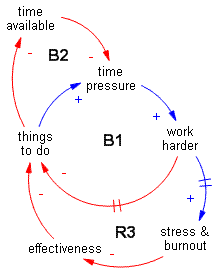
Fig. 3 – Stress, Burnout & Effectiveness
When the action taken doesn’t reduce things to do and subsequently time pressure the most often opted for approach is to work harder. While this may resolve the situation, it is usually not likely to as things to do is far larger than can be accommodated with work harder. And, if one continues under this misguided work harder mental model for an extended time the result is generally stress & burnout which subtracts from effectiveness, actually resulting in more things to do because of rework. This situation creates the Reinforcing Loop (R3). This is just one more instance of the best intentions leading one to where one least wants to be. The system wins! Always!
Note: A Reinforcing Loop is one in which the interactions are such that each action adds to the other. Any situation where action produces a result which promotes more of the same action is representative of a Reinforcing Loop. If you count the number of minus signs around the loop and there is an even number, or zero minus signs then it’s a Reinforcing Loop.
If the work harder approach doesn’t provide and answer suppose we take another approach.
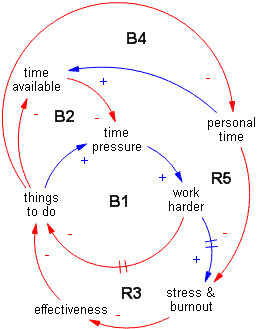
Fig. 4 – Personal Time
If one chooses to use personal time this will immediately increase time available for work and the sequence personal time, time available, time pressure, work harder, things to do, personal time forms the Balancing Loop (B4). This approach is flawed because reducing personal time also has a tendency to increase stress & burnout so the system responds much as previously described. And, what makes it even worse is that the sequence personal time, stress & burnout, effectiveness, things to do, personal time forms a viscous Reinforcing Loop (R5), acting to make things progressively worse. The more personal time you use the more personal time you will need to use.
And so in the midst of this dilemma Time Management comes to the rescue.
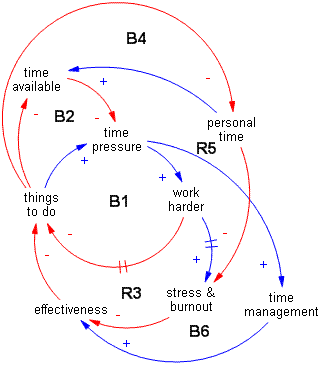
Fig. 5 – Time Management
The belief is that time management will improve effectiveness subsequently reducing things to do and therefore reducing time pressure thus creating Balancing Loop (B6). This all seems to make complete sense, and the diagram works. So why is it that in real life it just doesn’t seem to work this way? Why is it that time management doesn’t seem to reduce things to do and subsequently time pressure allowing individuals to reclaim the precious and essential personal time?
The critical piece of this system I have been purposely avoiding is founded in a belief structure.
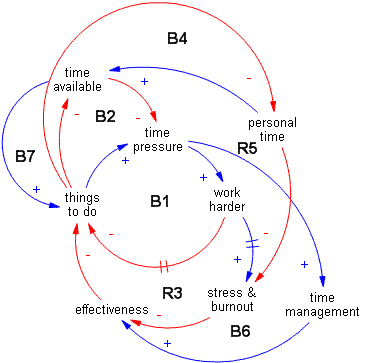
Fig. 6 – Belief Structure
What do you do when you have time available? Create things to do of course, which is depicted by the addition of the very viscous Balancing Loop (B7). Since we can’t conceive of having time available we in fact ensure that we have none. How could a person be earning their salary at work if they have time available. It is simply unthinkable. And if management believes you have time available it is quite certain they will attempt to ensure you don’t have it for long.
So, what the real answer comes down to is, to have time available, you first have to believe that it’s ok to have time available and actively identify things you can take out of the things to do category, or at least don’t need to be done by you. I would expect this answer probably difficult to accept. All I can say is, Been there! Done that!
- Causal Loop Diagrams
- Balancing Loop Systems Archetype
- Reinforcing Loop Systems Archetype
- Ladder of Inference: Short Circuiting Reality
- Diagrams created with MapSys
- MapSys Diagram Source
Systems Engineering News
Call For Papers: Requirements Engineering (RE) Journal
Special Issue On: Quality Requirements Engineering for Systems and Software Architecting: Methods, Approaches, and Tools
Important Dates:
Deadline for submission: 1 November 2010
Date of notification to authors (first round): 30 January 2011
Guidelines for submitting manuscripts:
http://www.springer.com/computer/swe/journal/766
Upcoming Submission Deadlines and Themes for INSIGHT
INSIGHT is the newsletter of International Council on Systems Engineering. It is published four times per year (January, April, July, October). INSIGHT features status and information about INCOSE’s technical work, local chapters, and committees and boards. Additionally, related events, editorials, book reviews, trends, and how-to-do articles that are pertinent to the many aspects of a systems engineer’s job are also included, as space permits.
Upcoming submission deadlines and themes for INSIGHT
| Issue | Submission Date for General Articles | Theme | Theme Editor | Deadline for Theme Article Proposal* |
| 2nd Qtr 2010 | 15 May 2010 | The Best of Loughborough: Highlights from the Conference on Systems Engineering Research and SEANET | Roy Kalawsky and Ricardo Valerdi | |
| 3rd Qtr 2010 | 8 Aug 2010** | 2010 International Symposium Coverage: Chicago, Illinois, USA | Jack Stein | 11 Nov 2009 |
| 4th Qtr 2010 | 15 Oct 2010 | Systems Development from Deep Sea to Deep Space: Lessons from the Johns Hopkins Applied Physics Lab | Mike O’Driscoll and Sam Seymour | |
| 1st Qtr 2011 | 15 Feb 2011 | Knowledge Management for Systems Engineering | Regina Griego | 21 May 2010 |
The 7th European Systems Engineering Conference (EuSEC) 2010
EuSEC 2010 Newsletter 4, April 22, 2010
INCOSE Webinar: An Update on INCOSE Professional Certification and the New Expert Systems Engineering Professional (ESEP) Designation
Date: 19 May 2010
Time: 15:00 UTC / 11 AM EDT
Presenter(s): Dave Walden, CSEP-Acq and Eileen Arnold, ESEP-Acq
General Webinar Details: http://www.incose.org/practice/webinars.aspx
Abstract:
INCOSE established its Professional Certification Program to provide a formal method for recognizing the knowledge and experience of Systems Engineering professionals. This webinar will provide an update on the INCOSE certification program and an introduction to its Expert Systems Engineering Professional (ESEP) designation. David Walden, CSEP-Acq, INCOSE Certification Program Manager, will give a brief update on the INCOSE certification program. He will highlight some of the recent certification changes as well as some of the positive indicators related to the on-going growth and recognition of the program. Eileen Arnold, ESEPAcq,
member and the immediate past Chair of the Certification Advisory Group (CAG), will provide an overview of the ESEP designation. The ESEP was introduced earlier this year and is targeted towards senior-level systems engineering leaders. She will describe the requirements for ESEP and go over the ESEP application process.
CALL FOR PAPERS: Requirements Engineering (RE) Journal Special Issue on Quality Requirements Engineering for Systems and Software Architecting: Methods, Approaches, and Tools
Guest Editors: Rafael Capilla, M. Ali Babar, Oscar Pastor
INCOSE International Symposium Opens Registration (26 Apr 10)
Featured Society – TBD
TBD
INCOSE Technical Operations
Risk Management Working Group (RMWG)
http://www.incose.org/practice/techactivities/wg/risk/
Charter
Identify risk management tools and methods; plan activities to expand knowledge; share information; and interface with related functions.
Leadership
Chair: Jack Stein, Terumo Cardiovascular System Corp.
Contact Risk Management Working Group for additional information or to join this group.
Presentations
![]() 2008 International Workshop Risk Management WG Summary Presentation Size: 200K
2008 International Workshop Risk Management WG Summary Presentation Size: 200K
Accomplishments/Products
- IS06 Risk Management Panel Session “Myriad Risk Management Standards”
Summary: Panel Session held at the 2006 International Symposium in Orlando. Panel summary published in INSIGHT October 2006 Volume 9 Issue 1 page 17. The following panelist slides and position papers were presented and discussed:
![]() Technical Panel: Myriad Multiplying Risk Standards – Jack Stein, Moderator (2.0m)
Technical Panel: Myriad Multiplying Risk Standards – Jack Stein, Moderator (2.0m)
![]() Presentation: Myriad Multiplying Risk Managements Standards – Robert Charette (7.7m)
Presentation: Myriad Multiplying Risk Managements Standards – Robert Charette (7.7m)
![]() Position Paper: A Risk of Too Many Risk Standards? – Robert Charette (46k)
Position Paper: A Risk of Too Many Risk Standards? – Robert Charette (46k)
![]() Presentation: A Window of Opportunity for INCOSE: The Zeroth Order Risk Management Standard – Mark Powell (487k)
Presentation: A Window of Opportunity for INCOSE: The Zeroth Order Risk Management Standard – Mark Powell (487k)
![]() Position Paper: A Window of Opportunity for INCOSE: The Zeroth Order Risk Management Standard – Mark Powell (63k)
Position Paper: A Window of Opportunity for INCOSE: The Zeroth Order Risk Management Standard – Mark Powell (63k)
![]() Presentation: The CMMI RSKM Process Area as a Risk Management Standard – Ray Williams (1.7m)
Presentation: The CMMI RSKM Process Area as a Risk Management Standard – Ray Williams (1.7m)
![]() Position Paper: The CMMI RSKM Process Area as a Risk Management Standard – Ray Williams (188k)
Position Paper: The CMMI RSKM Process Area as a Risk Management Standard – Ray Williams (188k)
![]() Presentation: Ensuring Safety and Efficacy for Medical Devices Through ISO 14971 – Stan Mastrangelo (for Alfred Dolan) (9.4m)
Presentation: Ensuring Safety and Efficacy for Medical Devices Through ISO 14971 – Stan Mastrangelo (for Alfred Dolan) (9.4m)
![]() Position Paper: Ensuring Safety and Efficacy through ISO 14971? Or “Much Ado about Nothing”? – Alfred Dolan (32k)
Position Paper: Ensuring Safety and Efficacy through ISO 14971? Or “Much Ado about Nothing”? – Alfred Dolan (32k)
![]() Presentation: Why an INCOSE Systems Approach is Needed – Dick Kitterman (2.8m)
Presentation: Why an INCOSE Systems Approach is Needed – Dick Kitterman (2.8m)
![]() Position Paper: Why an INCOSE Systems Approach is Needed – Dick Kitterman (50k)
Position Paper: Why an INCOSE Systems Approach is Needed – Dick Kitterman (50k)
![]() Presentation: A Path to Convergence of Risk Management Standards – Garry Roedler (1.5m)
Presentation: A Path to Convergence of Risk Management Standards – Garry Roedler (1.5m)
![]() Position Paper: A Path to Convergence of Risk Management Standards – Garry Roedler (47k)
Position Paper: A Path to Convergence of Risk Management Standards – Garry Roedler (47k)
- Frequently Asked Questions (FAQs)
Summary: Compiled a set of Frequently Asked Questions (FAQs) and responses relative to the risk management process; made available to interested users via the INCOSE Website and INCOSE INSIGHT publication. - Tenets of Risk Management
Summary: Compiled a set of tenets of risk management. The tenets are the fundamental principles that drive the effectiveness and efficiency of the risk management process. They are those things that are invariant with time and application. They are simple and basic statements that are unambiguous. - Risk Management Bibliography
Summary: Compiled a set of useful risk management references, include related websites and references available via the web. - RMWG Charter
Summary: Developed RMWG Charter for INCOSE approval that gives the mission, goals, structure, responsibilities and processes of the group in order to ensure continuity of direction as the RMWG evolves over time. - RMWG Website
Summary: Initiated a RMWG Website. Near-term objectives are content describing the RMWG, our goals and objectives, contacts and the results of the work done under projects defined to date. The original web page has been replaced by this page in standard INCOSE format. - INCOSE Publication with Risk Management Theme
Summary: Acted as theme editor for Volume 4, Issue 1 of the INCOSE INSIGHT publication dedicated to risk management papers developed by the RMWG. Note: those papers were presented at a symposium on risk management in the Hampton Roads area.
Current Projects
- Organize Risk Management Panel Session “Cultural, Psychological and Motivational Factors in Risk Management” to be held at the 2007 IS in Dan Diego.
- Monitor and assess RSKM standards, guides and other published material, making the results available to the INCOSE membership.
- Update the risk management sections of the next revision of the INCOSE SE Handbook (V4.0).
- Integration of LSE principles with RMWG work (e.g., Hdbk)
- Strengthen communication with INCOSE members through the RMWG website, RMWG meeting and IW and IS events.
- Re-establish a liaison with the INCOSE Measurement WG and Certification activities.
- Establish liaisons with risk management activities outside INCOSE (e.g., ISO, IEC, Carnegie Mellon SEI and PMI).
Systems Engineering Software Tools News
No Magic Announces the No Magic World Conference 2010
No Magic, Inc., announced that it is hosting the first Annual No Magic World Conference, on November 7-10, at the American Airlines Conference Center in Fort Worth, TX.
No Magic Expands and Strengthens its Cameo Suite with Major New Product Releases
No Magic, Inc., announced the general availability release of MagicDraw® 16.8, as well as version 16.8 releases for Cameo Business Modeler, Cameo Data Modeler, SysML plug-in, UPDM plug-in, and Cameo MDA 16.8. The company also announced the release of the Cameo Simulation Toolkit (Alpha release).
New in ParaMagic 16.6 SP1 – Solving Parametrics with OpenModelica
ParaMagic™ plugin is claimed to make MagicDraw SysML models come alive! Using the values and constraint relationships displayed in SysML parametric diagrams, model-builders can run simulations and trade studies for complex systems from concept through final test.
Systems Engineering Books, Reports, Articles and Papers
Maintenance and Reliability Best Practices
Ramesh Gulati (Author), Ricky Smith (Contributor)
Industrial Press, Inc, April 15, 2009
ISBN-10: 0831133112, ISBN-13: 978-0831133115
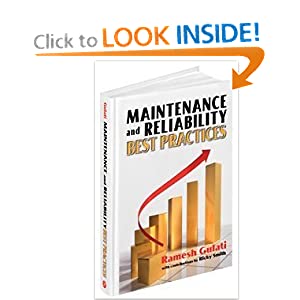 Product Description:
Product Description:
To manufacture quality products or provide services at competitive prices is essential to survive in today s business climate. We are forced to look for better ways of doing things on continual basis. To meet customer s needs on their schedule requires (high) availability and reliability of equipment and systems when they are needed. In the maintenance and reliability (M&R) field, professionals are constantly challenged to implement the best way to ensure equipment is available as and when it is needed at a reasonable cost. These are called best practices. But it is not as simple as putting something into effect. To truly realize a best practice requires learning, re-learning, benchmarking and implementing better ways of ensuring high reliability and availability of equipment and systems.
Maintenance & Reliability Best Practices is designed to support that learning process. Written by professionals with 60 plus years of shop floor and management experience in a variety of industries, this practical resource will help seasoned professionals and novices understand the basic principles of maintenance and reliability. Written in an easy-to-read format, each chapter discusses the concepts with specific questions and answers. Each topic answers the what, why or how of the topic being presented. Understanding and implementing M&R practices in a cost-effective way is essential. This is perfect book for designers who design the equipment; operators who operate; and maintainers who maintain, as well as warehouse and store personnel who procure and supply materials; engineers who improve the reliability; and human resource professionals who provide and arrange for a work force. Students specializing in the M&R field will also benefit. More information
Resilience and Ruggedness: Why Faster, Bigger and More Complex May Be Better
Alex Steffen, 10 Apr 10
“There’s a really cool event happening in Berkeley today, Design 4 Resilience: Thriving in an Uncertain World. It’s an open space, unconferency sort of show, not unlike the miniconference we held last weekend on how to rebuild Seattle as a carbon neutral.”…..
“I am really glad there are people revving up the conversation about resilience: it’s an essential debate to have. That said, some things about the way resilience is being defined, framed and envisioned in some of discussions strike me as veering from the helpful. While I don’t have time to offer a full-blown set of alternative solution-approaches, I thought a few ideas might be useful:”……..
Social Modeling for Requirements Engineering (Cooperative Information Systems)
Eric Yu (Editor), Paolo Giorgini (Editor), Neil Maiden (Editor), John Mylopoulos (Editor)
The MIT Press (January 31, 2011)
ISBN-10: 0262240556, ISBN-13: 978-0262240550
Product Description
Much of the difficulty in creating information technology systems that truly meet people’s needs lies in the problem of pinning down system requirements. This book offers a new approach to the requirements challenge, based on modeling and analyzing the relationships among stakeholders. Although the importance of the system-environment relationship has long been recognized in the requirements engineering field, most requirements modeling techniques express the relationship in mechanistic and behavioral terms. This book describes a modeling approach (called the i* framework) that conceives of software-based information systems as being situated in environments in which social actors relate to each other in terms of goals to be achieved, tasks to be performed, and resources to be furnished.
Social perspectives on computing have provided much insight for many years. The i* framework aims to offer a modeling approach to the relationships embedded in computer systems that is part of an engineering method that offers systematic techniques and tools providing smooth linkages to the rest of the system development process, including system design and implementation. The book includes Eric Yu’s original proposal for the i* framework as well as research that applies, adapts, extends, or evaluates the social modeling concepts and approach.
A Systems Approach Makes for Successful Engineering, Says Former Cornell Professor
By Anne Ju
“From leading Cornell’s championship RoboCup team to founding a company that uses robots for moving warehoused goods, former Cornell professor Raffaello D’Andrea brings a systems engineering approach to every project.
That was the message he conveyed as keynote speaker at the Systems Engineering Forum, held April 7-8.…”
Corporate Sigma: Optimizing the Health of Your Company with Systems Thinking
Anwar El-Homsi and Jeff L. Slutsky
Productivity Press; 1 edition (December 21, 2009)
ISBN-10: 1439803943, ISBN-13: 978-1439803943
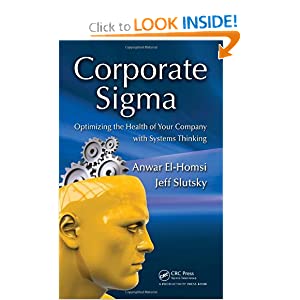 Product Description:
Product Description:
One study after the next shows that most employees are unhappy with their jobs and that less than a third actively engage with their work. That means that two out of every three are merely putting in their time, rather than maximizing productivity and attaining satisfaction. One could argue that such a malaise is the symptom of an unhealthy workforce.
Corporate Sigma: Optimizing the Health of Your Company with Systems Thinking shows you how to develop extraordinary competence in your employees. Your organization will function as a system capable of learning, adapting, developing, and growing according to the winning vision you set for it. Like Six Sigma, Corporate Sigma is a metric that assesses the quality or the health and wellness of an entire organization. But assessment is only the first step.
Providing you with distinctive tools that will transform your organization into a customer-driven, profitable, and continuous learning organization, this guide:
- Defines the roles that employees and managers should play in a healthy organization and the principles and values that will guide them
- Shows you how to build an inherent sense of purpose, possibility, and commitment in every employee
- Offers you the tools needed to link an entire organization and assess its effectiveness or wellness
Organized in self-contained sections, you can focus on what you believe needs direct attention, such as leadership, vision, or tools for lean improvement. However, once you start a healing journey, you are likely to discover the best cures are always holistic.
Conferences and Meetings
The First International Workshop on Dependable Services and Systems (IWODSS 2010)
May 17-18, 2010, Montreal, Quebec, Canada
http://users.encs.concordia.ca/~colombo/iwodss-10/
The 2010 International Symposium on Collaborative Technologies and Systems (CTS 2010)
May 17-21, 2010, The Westin Lombard Yorktown Center, Chicago, Illinois, USA
http://cisedu.us/cis/cts/10/main/callForPapers.jsp
Software Process Improvement and Capability dEtermination (SPICE) 2010
May 18-20, 2010 – Pisa, Italy
http://www.spiceconference.com/
2010 Galorath International User Conference
May 19, 2010, Williams F1 Conference Centre, Grove, Oxfordshire, UK
http://www.galorath.com/index.php/news/events-intl/
12th Annual NASA/ESA Product Data Exchange Workshop (PDE 2010)
May 18-20, 2010, Norway
http://conferences.esa.int/pde2010/
EuSEC 2010: Systems Engineering and Innovation
May 23-26 2010, Stockholm, Sweden
http://www.incose.org/eusec2010
Siemens PLM Connection Americas 2010
Gaylord Opryland, Nashville, TN, USA
May 24 – Thursday May 27, 2010
http://event.plmworld.org/registration/
XP2010 Workshop: Dealing With Usability in an Agile Domain
June 1, 2010,Trondheim, Norway
http://listserv.acm.org/scripts/wa.exe?A2=ind1002&L=SEWORLD&P=R13976
3rd International Conference – From Research to Teaching Formal Methods: The B Method (TFM-B’10)
June 7, 2010, Nantes, France
http://www.lina.univ-nantes.fr/apcb
The 22nd International Conference on Advanced Information Systems Engineering (CAiSE’10)
June 07-11, 2010, Hammamet, Tunisia
Exploring Modelling Methods for Systems Analysis and Design (EMMSAD 2010)
In conjunction with CAiSE 2010
June 7-8, 2010, Hammamet, Tunisia
http://emmsad.enterpriseengineeringnetwork.org/
11th Workshop on Business Process Modeling, Development, and Support (BPMDS’10)
In conjunction with CAiSE 2010
June 7-8, 2010, Hammamet, Tunisia
http://lams.epfl.ch/conference/bpmds10/
Fourth International i* Workshop – istar 2010
In conjunction with CAiSE 2010
June 7-8, 2010, Hammamet, Tunisia
http://www.cin.ufpe.br/~istar10/
6th International Workshop on Enterprise & Organizational Modeling and Simulation (EOMAS 2010)
In conjunction with CAiSE 2010
June 7-8, 2010, Hammamet, Tunisia
2nd International Workshop on Future Trends of Model-Driven Development
(FTMDD 2010)
In conjunction with the 12th International Conference on Enterprise Information Systems (ICEIS 2010)
June 8 – 12, 2010, Funchal, Madeira – Portugal
http://www.iceis.org/Workshops/ftmdd/ftmdd2010-cfp.htm
2nd International Workshop on Advanced Enterprise Architecture and Repositories
(AER 2010)
June 8 – 12, 2010, Funchal, Madeira – Portugal
http://www.iceis.org/Workshops/aer/aer2010-cfp.htm
21st IEEE International Symposium on Rapid System Prototyping
June 8-11, 2010, George Mason University, Fairfax, Virginia, USA
The Fourth IEEE International Conference on Secure Software Integration and Reliability Improvement (SSIRI 2010)
June 9-11, 2010, Singapore
http://paris.utdallas.edu/ssiri10/
Model-Based Verification & Validation from Research to Practice
2nd Workshop in conjunction with SSIRI 2010
June 9-11, 2010, Singapore
http://www2.wmin.ac.uk/bolotoa/MVV2010/mvv-2010.html
6th European Conference on Modelling Foundations and Applications
(ECMFA 2010)
June 15-18, 2010, University Pierre & Marie Curie, Paris, France
3rd Workshop on Model-based Testing in Practice
Held in conjunction with ECMFA 2010
June 15/16 2010, University Pierre & Marie Curie, Paris, France
http://www.fokus.fraunhofer.de/en/fokus_events/motion/motip_2010/index.html
The Fifth Workshop “From code centric to model centric: Evaluating the effectiveness of MDD (C2M:EEMDD)”
Held in conjunction with ECMFA 2010
June 15th-18th, 2010, University Pierre & Marie Curie, Paris, France
http://www.esi.es/modelplex/c2m/
2nd International Workshop on Model-driven Product Line Engineering
Held in conjunction with ECMFA 2010
June 15th-18th, 2010, University Pierre & Marie Curie, Paris, France
3rd Workshop on Model-Driven Tool & Process Integration
Held in conjunction with ECMFA 2010
June 16, 2010, University Pierre & Marie Curie, Paris, France
http://www.fokus.fraunhofer.de/en/fokus_events/motion/mdtpi_2010/index.html
117th Annual American Society for Engineering Education Conference
June 20 – 23, 2010, Louisville, Kentucky, USA
http://www.asee.org/conferences/annual/2010/
International Workshop on Formalization of Modeling Languages
Colocated with ECOOP 2010
June 21 or 22, 2010 – Maribor, Slovenia
http://www.cis.uab.edu/FML2010
![]() 31st International Conference on Application and Theory of Petri Nets and Other Models of Concurrency (PETRI NETS 2010)
31st International Conference on Application and Theory of Petri Nets and Other Models of Concurrency (PETRI NETS 2010)
10th International Conference on Application of Concurrency to System Design (ACSD 2010)
June 21-25, 2010, Braga, Portugal
http://acsd-petrinets2010.di.uminho.pt/?page=Main
2nd International Workshop on Abstractions for Petri Nets and Other Models of Concurrency
a satellite event of Petri Nets 2010
June 21, 2010, Braga, Portugal
http://www.win.tue.nl/apnoc2010/
ACSD 2010: 10th International Conference on Application of Concurrency to System Design
Collocated with Petri Nets 2010
June 21-25, 2010, Braga, Portugal
http://acsd-petrinets2010.di.uminho.pt/?page=ACSD2010
IEEE International Conference on Systems of Systems Engineering
June 22 to 24, 2010, Henry Ford College, Loughborough University, UK
http://www.lboro.ac.uk/service/publicity/whatson/event2282.html
ISARCS 2010 – 1st International Symposium on Architecting Critical Systems
Federated with CompArch 2010
June 23-25 2010 Prague, Czech Republic
http://www.isarcs.org/isarcs2010/
Conference on Systems Thinking & System Dynamics in the classroom
June 26-28, 2010, Babson Conference Center, Wellesley, Massachusetts, USA
![]() http://www.e3washington.org/events/item.html?id=89
http://www.e3washington.org/events/item.html?id=89
1st International Workshop on Collaborative Modeling & Simulation – CoMetS’10
June 28 – 30, 2010, TEI of Larissa (Greece)
http://www.sel.uniroma2.it/CoMetS10/
![]() ICMT2010 – Intl. Conference on Model Transformation
ICMT2010 – Intl. Conference on Model Transformation
Co-located with TOOLS Europe 2010, ICSMP 2010, SEAFOOD 2010, TAP 2010
June 28-July 2 2010 – Malaga, Spain
http://www.model-transformation.org/ICMT2010/
2nd International Workshop on Model Transformation with ATL
In conjunction with Tools 2010 Federated Conferences.
June 30, 2010 – Malaga, Spain
http://www.emn.fr/z-info/atlanmod/index.php/MtATL2010
16th International Working Conference on Requirements Engineering: Foundation for Software Quality (RefsQ 2010)
June 30 July 2, 2010, Essen, Germany
http://www.sse.uni-due.de/refsq/2010/
CREARE – 1st Workshop on Creativity in Requirements Engineering
Held in conjunction with REFSQ 2010, Essen, Germany
29th June 2010, in Essen, Germany
http://sites.google.com/site/creare2010/
![]() 1st Workshop “RE in Small Companies (RESC)”
1st Workshop “RE in Small Companies (RESC)”
Held in conjunction with REFSQ 2010, Essen, Germany
June 29, 2010, Essen, Germany
First International Workshop on Product Line Requirements Engineering and Quality (PLREQ’10)
Held in conjunction with REFSQ 2010, Essen, Germany
June 30, 2010, Essen, Germany
http://sites.google.com/site/plreq10/home
IV Brazilian e-Science Workshop
(in conjunction with CSBC 2010)
July 2010, Belo Horizonte, MG, Brazil
http://www.dcc.ufrj.br/~escience/
Transformation Tool Contest 2010
Satellite workshop to TOOLS 2010
July 1-2, 2010, Malaga, Spain
http://is.ieis.tue.nl/staff/pvgorp/events/TTC2010/
2010 International Conference on System Science and Engineering (ICSSE2010)
July 1-3, 2010, National Taipei University of Technology, Taipei, Taiwan
http://isd.ie.ntnu.edu.tw/ICSSE2010/
10th International Conference on Web Engineering
July 5 – 9, 2010 in Vienna, Austria
http://icwe2010.webengineering.org/
Summer Computer Simulation Conference (SCSC 2010)
July 11–14, 2010, Ottawa, Canada
http://www.dacya.ucm.es/jlrisco/SCSC10/doku.php
Eighth International Workshop on Dynamic Analysis (WODA 2010)
Co-located with ISSTA 2010
July 12th or July13th 2010, Trento, Italy
4th ACM International Conference on Distributed Event-Based Systems (DEBS 2010)
July 12-15, 2010, Cambridge, United Kingdom
20th Annual INCOSE International Symposium
July 11 – 15, 2010, Hyatt Regency O’Hare, Rosemont, IL, USA
http://www.incose.org/newsevents/events/details.aspx?id=77
4th IEEE International Workshop on Requirements Engineering For Services (REFS’10)
In conjunction with COMPSAC 2010
July 19 – 23, 2010, Seoul, Korea
http://compsac.cs.iastate.edu/workshop_details.php?id=22
1st International Workshop on Complexity and Real World Applications Using the Tools and Concepts from the Complexity Sciences to Support Real World Decision-making Activities
July 21-23, 2010, Southampton, England
http://iscepublishing.com/Forum/default.aspx?g=posts&m=227
System Dynamics Society 2010 Conference
July 25 – 29, 2010, Seoul, Korea
http://www.systemdynamics.org/conferences/current/index.htm
ECAI 2010 Workshop on Intelligent Engineering Techniques for Knowledge Bases
Aug 16, 2010, Lisbon, Portugal
http://ase.ist.tugraz.at/ecai_2010/
2nd International Workshop on Open Design Spaces (ODS 2010) – Socially ![]() Crafting Interactive Experiences
Crafting Interactive Experiences
in conjunction with DIS 2010
August 17 2010, Aarhus, Denmark
http://www.open-design-spaces.de/
7th Annual INCOSE SA Chapter Conference
August 17 – 19, 2010, CSIR International Convention Centre, Pretoria, South Africa
The 2nd International Workshop on Enterprise Architecture Challenges and Responses
To be held in conjunction with ICIS 2010
August 18 – 20, 2010, Yamagata University, Yonezawa, Japan
http://sewtl.towson.edu/weacr2010/
The Second International Conference on Advances in System Testing and Validation Lifecycle (VALID 2010)
August 22-27, 2010 – Nice, France
http://www.iaria.org/conferences2010/VALID10.html
Improving Systems and Software Engineering Conference (ISSEC 2010)
23 – 26 August 2010
Brisbane Convention & Exhibition Centre, Brisbane, Australia
Workshop on Multi-Agent Systems and Simulation (MAS&S)
![]() August 30 – Sep 3, 2010, Lyon (France)
August 30 – Sep 3, 2010, Lyon (France)
http://lisdip.deis.unical.it/workshops/mass10/
2nd International Workshop on Model-Driven User-Centric Design & Engineering (MDUCDE’10)
September 1st & 2nd, 2010, Valenciennes/France
http://www.zmmi.de/MDUCDE2010/
European Systems & Software Process Improvement and Innovation
September 1-3, 2010, Grenoble Institute of Technology, France
INTERACT 2011 – 13th IFIP TC13 Conference on Human-Computer Interaction
![]() September 05-09, 2011, Lisbon, Portugal.
September 05-09, 2011, Lisbon, Portugal.
![]() 3rd Workshop on Autonomic and SELF-adaptive Systems
3rd Workshop on Autonomic and SELF-adaptive Systems
September 8, 2010, Valencia, Spain
http://quercusseg.unex.es/waself/
1st International Workshop on Reuse in Business Process Management (rBPM 2010)
September 13, 2010, Hoboken, New Jersey – USA
http://each.uspnet.usp.br/rbpm2010/
Modeling Business Information Systems (MoBIS 2010)
September 15-17, 2010, Dresden, Germany
7th International Conference on Quantitative Evaluation of SysTems (QEST) 2010
September 15 – 18, 2010, Williamsburg, Virginia, USA at the College of William & Mary, Computer Science Department,
First International Workshop on Evolution Support for Model-Based Development and Testing (EMDT2010)
Co-located with the International Scientific Colloquium (IWK2010)
September 16, 2010, Ilmenau, Germany
15th International Workshop on Formal Methods for Industrial Critical Systems
(FMICS 2010)
September 20-21, 2010, Antwerp, Belgium
https://es.fbk.eu/events/fmics2010/index.php
8th International Symposium on Automated Technology for Verification and Analysis (ATVA 2010)
September 21-24, 2010, Singapore
http://atva10.comp.nus.edu.sg/index.html
EPEW 2010: 7th European Performance Engineering Workshop
University Residential Center of Bertinoro, Italy
September 23-24, 2010
http://www.sti.uniurb.it/events/epew2010/
Challenges of Systems Engineering – International Workshop (RuSEC2010)
September 23-24, 2010, Moscow, Russia
http://www.incose.ru/RuSEC2010
ACM International Conference on Design of Communication (SIGDOC’10)
September 26-29, 2010, São Carlos – São Paulo – Brazil
http://www.lia.dc.ufscar.br/SIGDOC2010/
54th Annual Meeting of the Human Factors and Ergonomics Society
September 27-October 1, 2010, San Francisco, USA
http://www.hfes.org/web/HFESMeetings/2010annualmeeting.html
Fourth IEEE International Conference on Self-Adaptive and Self-Organizing ![]() Systems (SASO 2010)
Systems (SASO 2010)
September 27-October 1, 2010, Budapest, Hungary
http://www.inf.u-szeged.hu/saso10/index.php
Workshop on Socio-Economics Inspiring Self-Managed Systems and Concepts ![]() (SEISMYC 2010)
(SEISMYC 2010)
Located at SASO 2010
September 27th, 2010, Budapest, Hungary
The 18th International Requirements Engineering Conference (RE 2010)
September 27, 2010 – Oct 1, 2010, Sydney, Australia
Doctoral Symposium @ RE2010![]()
September 27, 2010, Sydney, Australia
http://attend.it.uts.edu.au/re10/?page_id=293
Third International Workshop on Managing Requirements Knowledge ![]() (MaRK’10)
(MaRK’10)
September 27, 2010, Sydney, Australia
http://www1.cs.tum.edu/static/mark10//
1st Workshop on The Web and Requirements Engineering (WeRE’10)
![]() To be held in conjunction with the RE 2010 Joint Conference
To be held in conjunction with the RE 2010 Joint Conference
September 28, 2010, Sydney, Australia
http://gplsi.dlsi.ua.es/congresos/were10/
Third International Workshop on Requirements Engineering and Law
In conjunction with the 18th IEEE International Requirements Engineering Conference
September 28, 2010, Sydney, Australia
http://www.csc2.ncsu.edu/workshops/relaw/
Fifth International Workshop on Requirements Engineering Visualization (REV’10)
September 28, 2010 – Sydney, Australia
http://www.gotel.net/REV10.html
Fourth IEEE International Conference on Self-Adaptive and Self-Organizing Systems (SASO 2010)
September 27-October 1, 2010, Budapest, Hungary
http://www.inf.u-szeged.hu/saso10/
Model-based Testing and Test Automation – From Research into Practice (MoTes2010)
September 27 – October 2, Leipzig, Germany
http://adt.uni-paderborn.de/aktuelles/news-unterseiten/motes10cfp.html
9th International Workshop on Parallel and Distributed Methods in verifiCation
joint with 2nd International Workshop on High Performance Computational Systems Biology (HiBi 2010)
September 30 – October 1, 2010, Twente, The Netherlands
Co-locating with 5th International Conference on Graph Transformation (ICGT 2010)
September 29 – October 1, 2010
17th Annual workshop on Software Model Checking (SPIN 2010)
September 27 – 29, 2010
Fifth International Conference on Graph Transformation
University Of Twente, Enschede, The Netherlands
September 27 – October 2, 2010
http://www.utwente.nl/icgt2010/
![]() 4th International Workshop on Graph Based Tools
4th International Workshop on Graph Based Tools
A satellite event of ICGT’10
September 28th 2010, University of Twente, Enschede, The Netherlands
http://grabats2010.inf.mit.bme.hu/
ACM/IEEE 13th International Conference on Model Driven Engineering Languages and Systems (MODELS 2010)
October 3-8, 2010, Oslo, Norway
Fourth Asia-Pacific Conference on Systems Engineering (APCOSE 2010)
October 4-6, 2010, Keelung, Taiwan
http://www.incose-taiwanchapter.org/APCOSE2010/
2010 isee User Conference
October 4-6, 2010, The Westin Providence, Providence, Rhode Island, USA
http://www.iseesystems.com/community/UserConference/Announcement.aspx
IFM 2010: Integrated Formal Methods 8th International Conference
October 11 – 14, 2010, Nancy, France
Sixth Nordic Conference on Human-Computer Interaction (NordiCHI 2010)
October 16 – 20, Reykjavik Iceland
http://www.yourhost.is/nordichi2010
International Institute of Business Analysis (IIBA) Conference
October 17-21, 2010, Alexandria, VA, USA
http://iiba.informz.ca/IIBA/archives/archive_54465.html
![]() Dynamic Languages Symposium 2010
Dynamic Languages Symposium 2010
Co-located with SPLASH 2010
In cooperation with ACM SIGPLAN (PENDING)
October 18, 2010, Reno, Nevada, USA
http://www.dynamic-languages-symposium.org/dls-10/
FMCAD 2010 – Formal Methods in Computer Aided Design
October 20 – 23, 2010, Lugano, Switzerland
http://fmcad10.iaik.tugraz.at/
NDIA 13th Annual Systems Engineering Conference
October 25-28, 2010, Hyatt Regency Mission Bay, San Diego, CA, USA
http://www.ndia.org/meetings/1870/Pages/default.aspx
Requirements Days 2010
October 26 – 28, 2010, Mϋnchen, Germany
Complex Systems Design & Management 2010
October 27-29, 2010, Paris, France
http://www.incose-taiwanchapter.org/APCOSE2010/
5th International Workshop on Enterprise Integration, Interoperability and ![]() Networking (EI2N’2010)
Networking (EI2N’2010)
October 27-28, 2010, Hersonissou, Crete, Greece
http://www.onthemove-conferences.org/index.php/ei2n2010
29th International Conference on Conceptual Modeling (ER 2010)
November 1-4, 2010, Vancouver, BC, Canada
http://www.er2010.sauder.ubc.ca/
Seventh International Workshop on Web Information Systems Modeling (WISM ![]() 2010)
2010)
(Held in conjunction with ER 2010)
November 1-4, 2010, Vancouver, BC, Canada
http://people.few.eur.nl/frasincar/workshops/wism2010/
2010 IITA International Conference on Control, Automation and Systems Engineering (CASE 2010)
November 7-8, 2010, Taipei, Taiwan
http://www.wikicfp.com/cfp/servlet/event.showcfp?eventid=7428©ownerid=2
Annual Systems Engineering Conference 2010 (ASEC10)
November 8-10, 2010, Heythrop Park Hotel, Chipping Norton, Oxfordshire, UK
http://www.incoseonline.org.uk/Groups/UKChapter/Show_Event_Details.aspx?CatID=Events&EventID=138
SEPG Latin America 2010
November 10-12, 2010, Medellín, Colombia
http://www.esi.es/SEPGLA/convocatoria.php
CMMI 10th Annual Technology Conference and User Group
November 15-18, 2010, Hyatt Regency Tech Center – Denver, Colorado, USA
http://www.ndia.org/meetings/1110/Pages/default.aspx
![]() 5th Trends in Enterprise Architecture Research (TEAR2010) workshop
5th Trends in Enterprise Architecture Research (TEAR2010) workshop
November 12, 2010 as part of the Enterprise Engineering Week at the Delft University of Technology, Delft, The Netherlands from the 9th of November to the 12th of November
http://tear.enterpriseengineeringnetwork.org/
ICISE 2010: International Conference on Intelligent Systems Engineering
December 18, 2010, Bangkok, Thailand
http://www.waset.org/conferences/2010/bangkok/icise/
ICECSE 2011 “International Conference on Electrical, Computer and Systems Engineering”
January 25-27, 2011, Dubai, United Arab Emirates
http://www.waset.org/conferences/2011/dubai/icecse/
Education and Academia
Studentship in Systems Engineering
Loughborough University – Optimised Selection of Aircrew Training Media for Future Operations
Loughborough University invites applications for a 3.5 year research studentship in the Department of Electronic and Electrical Engineering at Loughborough University, leading to the award of a PhD degree.
Body of Knowledge and Curriculum to Advance Systems Engineering
BKCASE (pronounced “Bookcase”) is the acronym for the Body of Knowledge and Curriculum to Advance Systems Engineering. The BKCASE project is led by a university partnership between the Stevens Institute of Technology and the Naval Postgraduate School. The project scope is to define a Systems Engineering Body of Knowledge (SE BoK) and use the SE BoK to develop an Advanced Graduate Reference Curriculum for Systems Engineering (GRCSE, pronounced “Gracie”).
The ideal outcome is that the SE BoK will be supported worldwide by the Systems Engineering community as the authoritative BoK for the SE discipline and that the GRCSE will receive the same global recognition and serve as the authoritative guidance for graduate degree programs in SE. A leading group of systems engineers from across the world will volunteer as authors and reviewers on the project to collaborate over a three year period and deliver two quality products, the SE BoK and GRCSE, to the public in 2012.
Systems Thinking and Organisational Change Research Group (Sytoc)
The University of Derby has recently started a Research group in Systems Thinking and Organisational Change. They are interested in researching the possible impacts of Systems Thinking on Organisational Change and Business Improvement within the public sector and would welcome the opportunity of engaging with practitioners to widen their expertise and knowledge.
Some Systems Engineering-Relevant Websites
This webpage makes the point that one area that is clearly missing in the current systems engineering landscape is the means by which information from the variety of tools and applications used in Systems Engineering can be integrated. Due to the distributed nature of Systems Engineering and the large, disparate datasets that SEs create, the use of Semantic Web technology solves many problems that other approaches find challenging. Built-in global identifiers are one example of the advantages that come from using Semantic Web standards. OWL and RDF provide a wide range of capabilities for modeling SE concepts and integrating data based on those concepts.
This website describes two SE products. inteGREAT Requirements Studio is an automated requirements developing platform that enables users to define, analyze, simulate and document requirements automatically for all SDLC Roles. inteGREAT Enterprise 2010 is said to be a complete solution to various complexities and hurdles businesses face for executing projects. inteGREAT Enterprise 2010 provides duplex integration with Visual Studio Team System, SharePoint, Word, Excel, Visio, Project and Expression Blend with Sketchflow.
http://www.acq.osd.mil/se/index.html
The Office of the Director, Systems Engineering (DSE) is the focal point for all policy, practice, and procedural matters relating to Department of Defense Systems Engineering and its key elements to include technical risk management, software engineering, manufacturing and production, quality, standardization, and related disciplines.
http://www.derby.ac.uk/dbs/research
Systems Thinking and Organisational Change Research Group (Sytoc) – Sytoc is a research group focusing on the service sector in both public and private organisations. We conduct national and international research projects in systems thinking and organisational change.
Standards and Guides
ISO 31000 and the Icelandic volcano crisis
The air traffic crisis provoked by the Icelandic volcano eruption, with its accompanying economic and societal effects, is analyzed through the lens of the ISO 31000 risk management standard in a new article just posted on ISO’s Website.
ISO/IEC JTC1/SC7 Plenary meeting
23–28, May 2010, Niigata, Japan
Host
Information Processing Society of Japan /Information Technology Standards Commission of Japan(IPSJ /ITSCJ)
Organizer
IPSJ /ITSCJ
Organizer contact: Jacky Takahashi at: inq-sc7niigata@itscj.ipsj.or.jp
Meeting location
Toki Messe Niigata Convention Center
Address: 6-1, Bandai-jima, Niigata-city, 950-0078, Japan
Web: http://www.tokimesse.com/english/
A Definition to Close on
TBD
PPI News
TBD
TBD
PPI Events (see www.ppi-int.com)
Systems Engineering Public 5-Day Courses (2010)
{Julie to plug in list by location to end of December 2010}
Requirements Analysis and Specification Writing Public Courses (2010)
{ Julie to plug in list by location to end of December 2010 }
Software Engineering Public 5-Day Courses (2010)
{ Julie to plug in list by location to end of December 2010 }
OCD/CONOPS Public Courses (2010)
{ Julie to plug in list by location to end of December 2010 }
Cognitive Systems Engineering Courses (2010)
{ Julie to plug in list by location to end of December 2010 }
PPI Upcoming Participation in Professional Conferences
{Julie to plug in – cover the rest of 2009 and to July 2010}
Kind regards from the SyEN team:
Robert Halligan, Managing Editor, email: rhalligan@ppi-int.com
Alwyn Smit, Editor, email: asmit@ppi-int.com
Luke Simpson, Production, email: lsimpson@ppi-int.com
Project Performance International
2 Parkgate Drive, Ringwood, Vic 3004 Australia
Tel: +61 3 9876 7345
Fax: +61 3 9876 2664
Tel Brasil:
Tel UK:
Tel USA:
Web: www.ppi-int.com
Email: contact@ppi-int.com
Copyright 2009 Project Performance (Australia) Pty Ltd, trading as Project Performance International
Tell us what you think of SyEN: email to contact@ppi-int.com
If you do not wish to receive a copy monthly of SyEN in future, please reply to this e-mail with “Remove” in the subject line. All removals are acknowledged; you may wish to contact PPI if acknowledgement is not received within 7 days.
